Lucan, Palmerstown & Adamstown
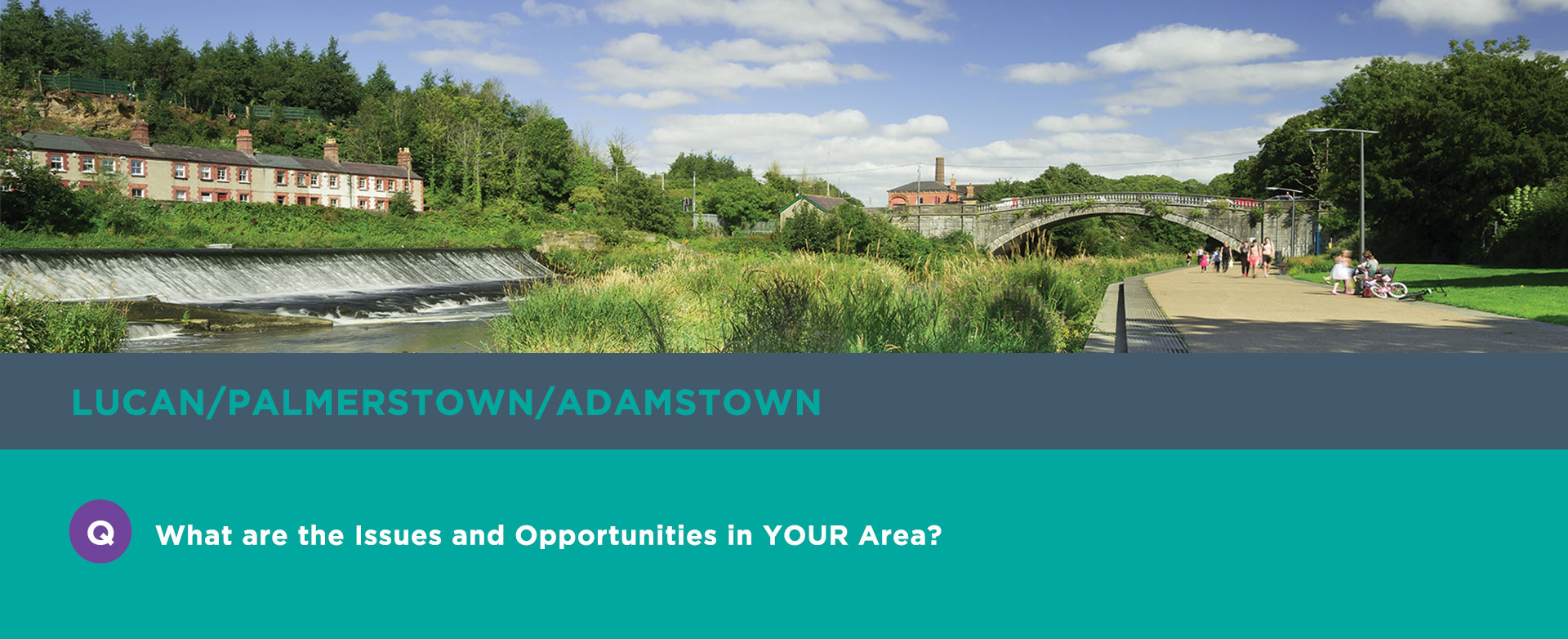
Introduction
Built Environment & Placemaking
Climate Action & Energy
Population Growth & Housing
Sustainable Movement
Community Services
Economic Development & Employment
Natural Heritage & Biodiversity
Infrastructure & Utilities
Introduction & Context
In this neighbourhood, Lucan and Palmerstown are traditional villages with unique characters. Lucan village is situated 15km from Dublin City and linked via the N4 national primary route. The M50, which is a major transport corridor traverses the neighbourhood and Palmerstown is situated inside this orbital route, 9km from Dublin City centre.
Adamstown, a Strategic Development Zone (SDZ), is an emerging new town south of Lucan village, situated 16 kilometres from Dublin City. Adamstown already has 2,613 homes built and over 3,500 new homes granted planning Introduction & Context permission. When built out, it will provide up to c. 9,000 homes and associated amenities, retail, services and schools. Significant levels of physical and social infrastructure have been provided in tandem with housing development in Adamstown, with more to come as further phases of housing are built out.
This neighbourhood is located on the N4 economic corridor, which is a key national transport corridor and has direct bus links to Dublin City centre. The Kildare railway line runs through the area and links Adamstown to Clonburris, Dublin City and beyond.
This area is a significant settlement in regional terms and includes major shopping e.g Liffey Valley, commercial, health, heritage, cultural and community facilities. The area also includes the River Liffey valley, which is protected under a Special Amenity Area Order (SAAO).
Built Environment & Place Making
Key to providing great places in which to live will be ensuring that in the delivery of a compact pattern of growth and development, a clear
focus is kept on high-quality design and successful placemaking. The successful delivery of such measures within this neighbourhood will require a mix of uses, connections to sustainable transportation and a joined-up approach to community and infrastructure planning.
Adamstown SDZ is an example of how higher density communities and good placemaking can be successfully combined. Lucan village has a strong sense of place aided by incorporation of the Griffeen river into the village green and strong, vibrant street frontages.
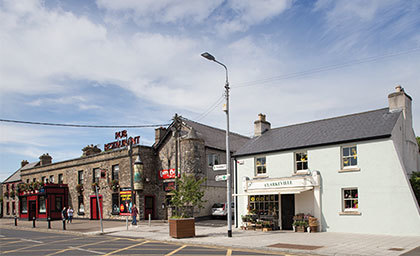
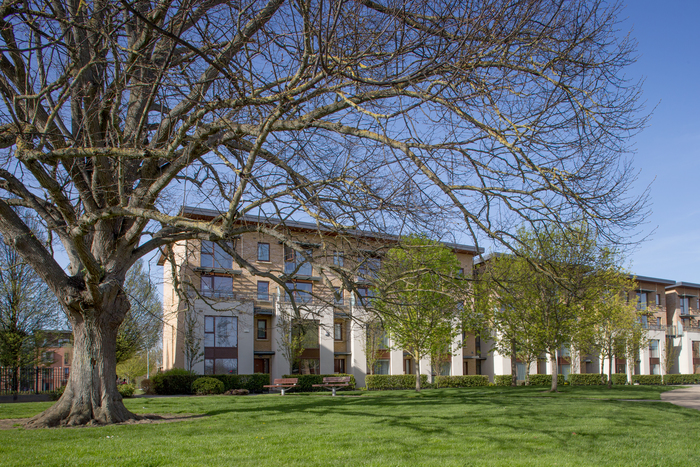
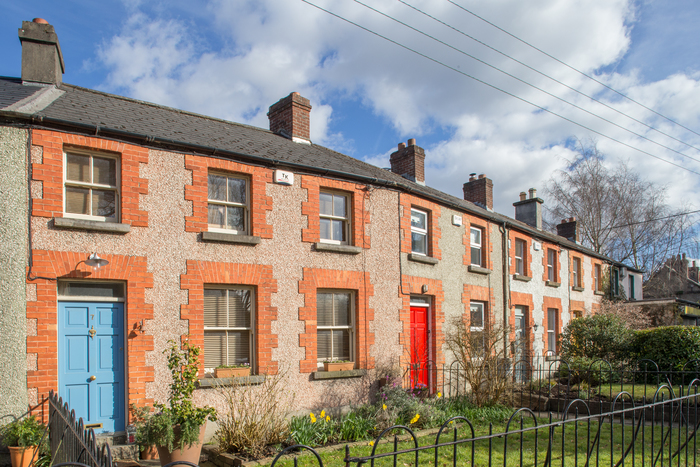
Climate Action & Energy
Future development will aim to reduce climate change at a local level through more efficient settlement and travel patterns, greater renewable energy use and the protection and enhancement of green infrastructure. This Neighbourhood will aim to increase access to sustainable transport routes in order to integrate land use and transportation, reduce carbon emissions and encourage a shift away from the car. The layout of new buildings will be important to ensure maximum solar gain and for both light and heat.
Population Growth & Housing
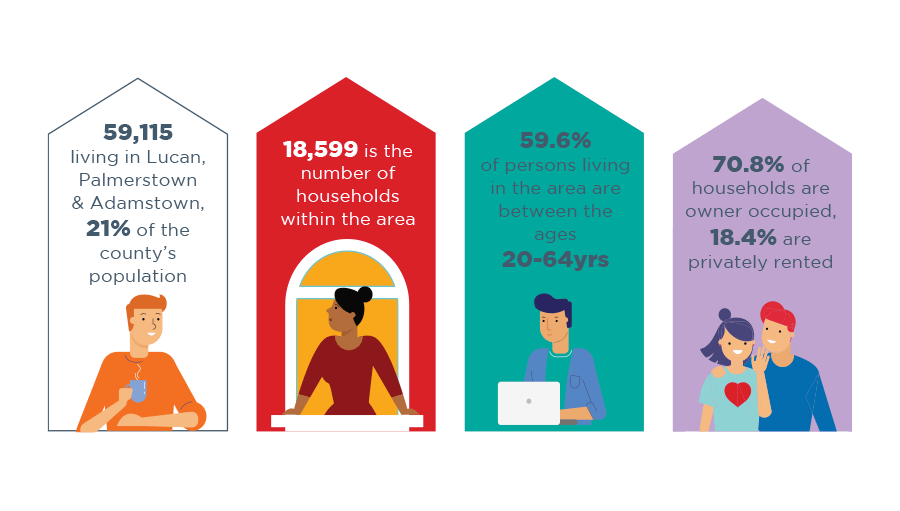
The growth of the Lucan, Palmerstown and Adamstown Neighbourhood must be consistent with key national and regional objectives and the proper planning of Dublin as a sustainable compact city, integrating land use and sustainable transport modes.
National and Regional planning policy emphasises; compact growth in the Dublin Metropolitan Area and; placemaking through the development of attractive places supported by existing and planned transport infrastructure now and into the future. Adamstown Strategic Development Zone (SDZ) has seen large scale residential, educational and community facilities developed in the last 4 years, with further provision made within the SDZ to yield a significant quantum of housing, retail, services and amenities.
The Regional Spatial and Economic Strategy for the Metropolitan Area identifies this area within the “South- West Corridor” forming part of the Metropolitan Area Strategic Plan (MASP) where strategic residential and employment development is targeted in order to achieve compact sustainable and sequential growth.
Adamstown will therefore be a key growth enabler for the Metropolitan Area.
SustainableMovement
The compact growth of the Neighbourhood with an efficient integrated public transport system will enhance the competitiveness and enable sustainable mobility choices for existing and future residents.
The Development Plan will aim to maximise the potential of existing transport corridors such as the Kildare Rail Line electrification as far as Hazelhatch by 2022 is anticipated under the DART Underground project); Luas Red line extension; bus and Luas Interchange facilities, Bus connects delivery with bus corridors and redesigned bus route network.
In addition, the Western Canals Loop strategic cycling Greenway, linking the Grand Canal at Adamstown to the Royal Canal at Lucan/Leixlip via Griffeen Valley Park and Liffey Valley provides additional tourism and leisure opportunities and potential commuting routes.
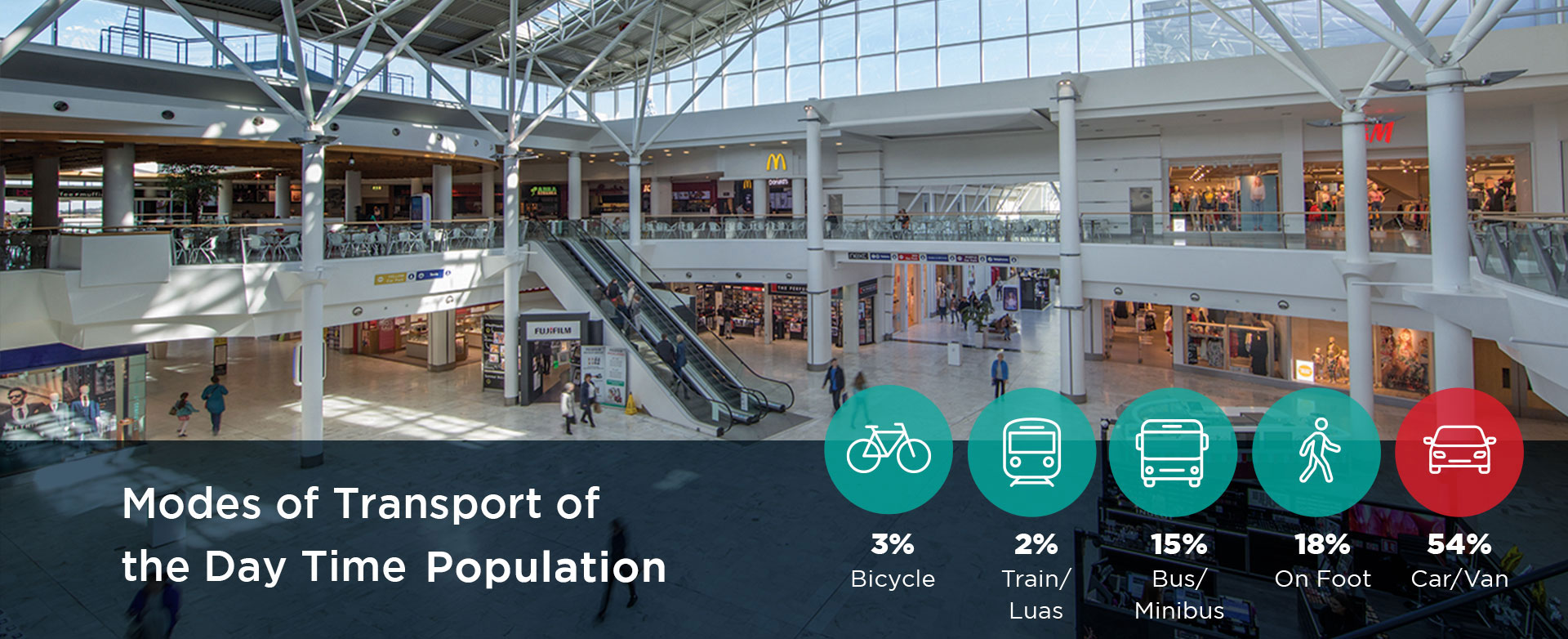
Services
Sustainable neighbourhoods are supported by a range of community facilities that are fit for purpose, accessible and adaptable now and into the future.
Educational facilities play a key role in creating sustainable communities. The Council works closely with the Department of Education to deliver educational facilities throughout the county. Primary and post primary schools have recently opened in Adamstown with complementary community facilities including a community centre and astro pitch.
Public investment has taken place in this area through the provision of new facilities such as Lucan Sports and Leisure Centre and a range of playing pitches in Waterstown Park, Ballyowen Park and Griffeen Park. Further community amenities are due to come forward including the new Lucan Swimming Pool, Airlie Park and Tandy’s Lane Park.
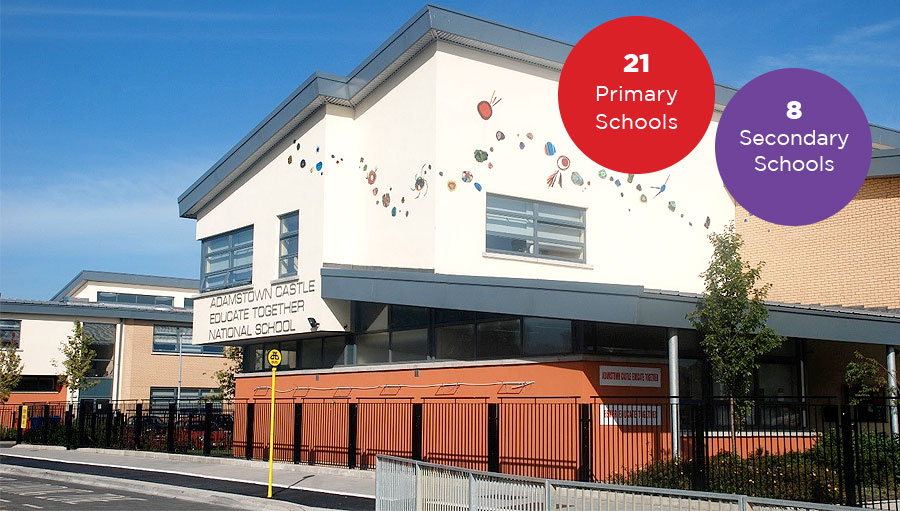
Economic Development
This area provides for a strong mix of employment types served by a well-connected public transport and road infrastructure network.
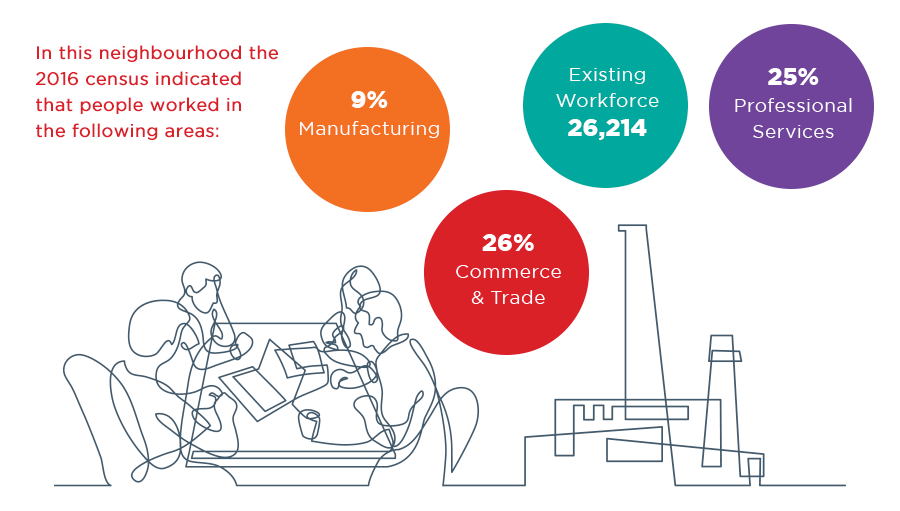

Retail
The neighbourhood is supported by a network of retail developments, including Liffey Valley, which is designated as a Major Retail Centre in the Retail hierarchy, providing a full range of all types of retail services, boutiques, department stores and food stores.
Tourism
Tourism is a significant economic driver and is considered a key growth sector in the Irish economy. Built and natural assets in this area have the potential to develop tourism further.
Natural Heritage & Biodiversity
Liffey Valley has a Special Amenity Area Order and is also designated as a Landscape Character Area within the Landscape Character Assessment of South Dublin County (2015). The area along the River Liffey provides a rich biodiversity in terms of ecological value and is listed as a proposed Natural Heritage Area. Two biodiversity-rich Council parks also occur along the Liffey, Waterstown Park and Lucan Demesne (St. Catherine’s).
The Plan will incorporate and plan for Natural Heritage and Biodiversity through the development and implementation of a Green Infrastructure (GI) Strategy,Landscape Character Assessment (LCA). Liffey Valley also has a protective zoning objective in the current Development Plan.
Built Heritage
There are two Architectural Conservation Areas within this neighbourhood, Lucan Village and Palmerstown Lower (Mill Complex), giving fine examples of areas or structures that are of special architectural, historical, archaeological, social, artistic, technical and cultural interests.
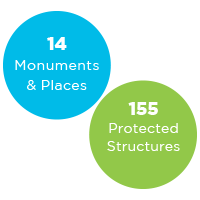
Infrastructure & Utilities
We can create efficiencies by targeting investment through greater alignment of land use and infrastructure. This will help to combat continued urban sprawl, achieve a smaller carbon footprint and enable focused investment in the neighbourhood. There had been significant infrastructure investment including the train station at Adamstown, public parks commenced at Adamstown, a link road to the Celbridge Road, Waterstown Park in Palmerstown, and a village improvement scheme planned for Lucan. Weston aerodrome is located near Lucan. Run by a private operator it is publicly licensed.
The potential for improving the provision of renewable energy at a local or wider level can be explored as part of the Development Plan process.
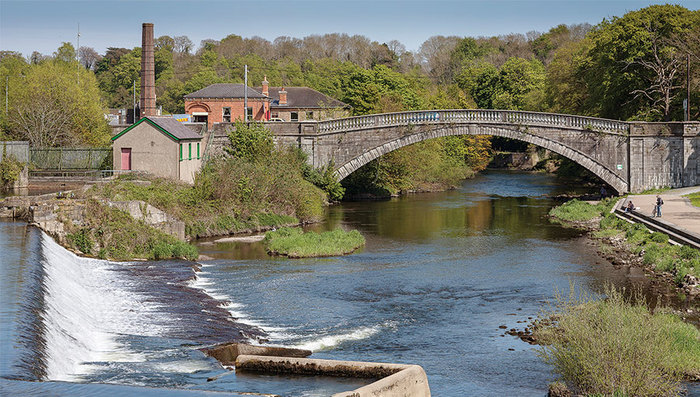
Back to the Top